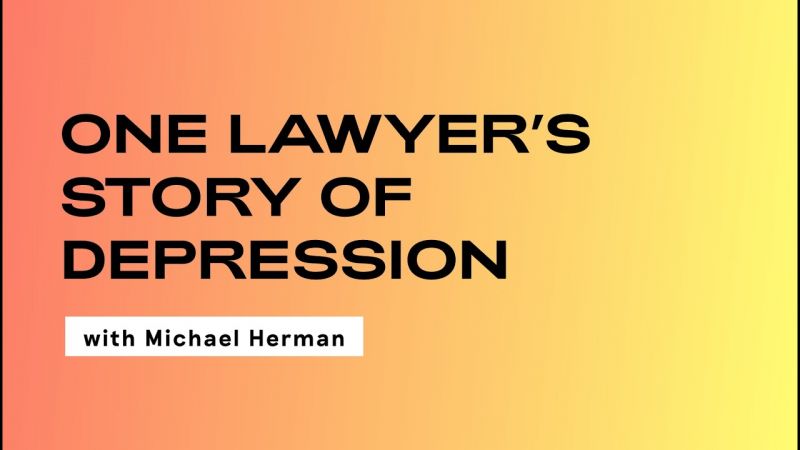Where Depression Goes, Shame Often Follows
How I overcame decades of believing that I was at fault for suffering.
Written by Michael Herman

01 In 2016, Michael had to take a long-term disability leave from his law firm due to his depression.
02 For many years, self-stigma caused him to suppress his issues and not seek the help he needed.
03 By challenging his self stigma and shame, he was able to gain a better perspective on his depression, and incorporate positive changes into his life.
Shame is a soul eating emotion - Carl Jung
My story of depression is unique, as is everyone’s experience with any mental health condition. However, from what I have read, and from talking to others, there seem to be common denominators to most people’s experience with depression. This includes the enormous impact it has on our physical and mental health, the sense of isolation, the inability to see the positive in anything, feelings of worthlessness and self-loathing, and the almost irresistible urge to stay in bed, pull the covers over our heads and shut the world out.
While awareness about mental health issues has increased over the past several decades — particularly in the legal profession to which I belong — the number of people suffering from depression continues to rise. And polling over the past 16 months reveals that the COVID-19 pandemic has made this situation worse. For lawyers, rates of depression, anxiety, substance misuse or other mental health issues far exceed rates in the general population.
We cannot effectively address problems within the legal profession, or society in general, without eliminating stigma and creating a better understanding of what mental health issues are really about. The Oxford Dictionary defines stigma as, “A mark of disgrace associated with a particular circumstance, quality, or person.” Think about that for a moment: having depression is considered a “mark of disgrace.”
It is incredibly important for people to know that depression is an illness and not a personal failing. If we want to create safe environments for people to come forward and seek help, we need to eliminate any stigma associated with having a mental health issue in the first place.
I would not wish mental health difficulties on anyone. Due to a severe depressive episode that began in 2016, I needed to take a long-term disability leave from my law firm. For most of that lengthy period, I had no idea whether I would ever be able to return to work — I felt lost and hopeless. Thankfully, with tremendous professional and personal support, I was able to resume my career. As I pursued my journey of recovery, I began learning things about myself that I probably wouldn’t have discovered if not for my depression. I also recognize that there is still much to learn, and my journey of recovery will last the rest of my life.
One of the most important lessons I learned was about stigma. I had always thought of myself as someone who did not stigmatize those living with depression or other mental health issues, but I failed to realize that this attitude did not extend to me. When it came to my own mental health, I bought into stigma completely.

One Lawyer’s Story of Depression
An insidious effect of stigma is that many of us unconsciously believe that if we have mental health issues, we are weak and to blame for our conditions — I know I believed that. I thought I deserved the “mark of disgrace.” I also thought I should be able to solve all of my issues on my own and simply “snap out of it.” Not surprisingly, this prevented me from acknowledging to anyone, including myself, that I needed help.
For many years, as I went through periods of mild to moderate depression, I would soldier on, continuing to do my work even though I was having a tough time with energy, concentration and motivation. I eventually started to feel better, even though I was suppressing and ignoring my issues. However, when I crashed in 2016, no amount of trying to “push through” worked anymore.
Why did I ignore all of the red flags whenever I came out of a depressive period? I am sure there were numerous psychological forces at play, but I attribute most of the reason to self-stigma that inevitably led to feelings of shame. I am not sure there is a more toxic emotion than shame, especially when you cannot admit to yourself that you feel it. I was ashamed of feeling shame.
The extraordinary Brené Brown describes shame as, “the intensely painful feeling or experience of believing that we are flawed and therefore unworthy of love and belonging.” No wonder I avoided and ignored my problems. However, Brown notes that, “Shame is never known to lead us to positive change.”
During my severe depressive episode, it was crucial for me to challenge self-stigma and shame because they held me back from seeking the help I needed.
I started by reading Brown’s book, Daring Greatly…twice. I finally admitted to my therapist and myself how much shame I felt about being depressed. Only then was I able to start the hard work of overcoming decades of believing that I was at fault for suffering with depression. I started to examine why I felt that way and opened up to the possibility that I was just plain wrong. With support, I fought an inner battle to overcome my conditioning, gradually loosening the grip of self-stigma and shame. Slowly, I began to develop a different perspective on my experience of depression.
By challenging self-stigma and shame, I was able to make some positive changes. I started incorporating time for self care, because I felt I was worth it. I found ways to remind myself that I am enough as I am, and I am not worthless, weak or undeserving.
For example, I started journaling first thing every morning. It is mainly just a stream of consciousness; however, I try to remember to note what I accomplished the prior day, no matter how insignificant. I also made time for daily mindfulness meditation. I could write an article devoted to how meditation practice has helped me. For now, I will say I am learning to be aware of what is occurring in the present moment – the good, the bad and the ugly.
Related Conditions
As best I can, I allow things to exist just as they are, exploring what is occurring with some curiosity and interest, and noticing when self-judgment and my inner critic grab a hold of me. It sounds simple but it is definitely not easy. Journaling and mindfulness meditation have become part of my routine. They are ways that work for me, helping to stop self-defeating thoughts from taking root, leading to a downward spiral into depression.
I wish I could tell you that I no longer struggle with self-stigma and shame, or that I believe I will not relapse into another acute depressive episode. I frequently feel as if I am on the edge of a cliff where at any moment, I could lose my balance or be hit by a gust of wind and fall back into a deep dark hole. However, I do believe that by confronting my self-stigma and shame, I will be able to recover much more quickly should a relapse occur. I have moved on from what I felt when I was in the depths of my depression — from hopelessness to hope, and now belief. The final stage will be self-trust, and while I am not there yet, I am working on it.
<>
ABOUT THE AUTHOR
Michael Herman is a Toronto-based business law partner at Gowling WLG. He also serves as general counsel to the firm.
He is a strong advocate for mental health in the legal community. Through his ongoing work to raise awareness and eliminate stigma, he hopes to make it easier for anyone experiencing mental illness to come forward and seek help without fear of judgment. You can find him on Linkedin at Michael Herman.
Support our work
We’re on a mission to change how the world perceives mental health.



















